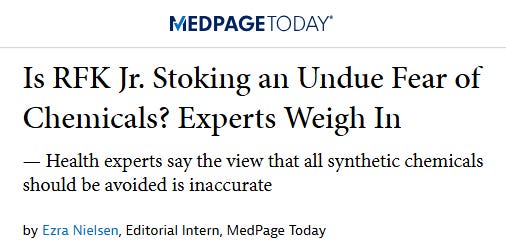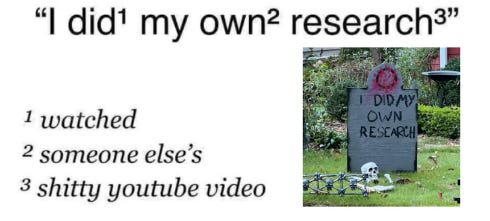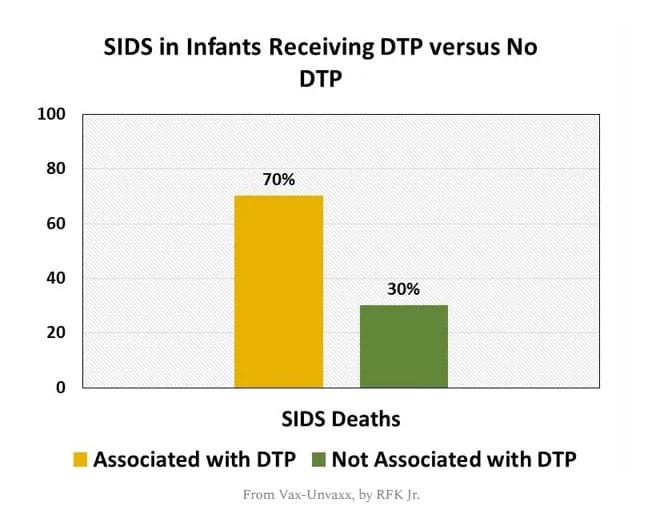
✍️ By Jenna Mccarthy
You’d think the entire world would be on its feet celebrating the fact that we finally have someone in charge of public health who doesn’t think a balanced breakfast starts with Froot Loops and ends with an mRNA booster. If kicking chemicals to the curb were an Olympic sport, Robert F. Kennedy would be well on his way to taking home the gold.
First, he set his sights on banning artificial food dyes. Next, he put fluoride on the chopping block. Then he went after vaccines containing thimerosal—you know, the mercury-based preservative that happens to be a known neurotoxin (and is the reason pregnant women are told to steer clear of tuna and swordfish and why schools used to call in HAZMAT teams when a thermometer broke). It’s starting to look like if it’s synthetic and sounds vaguely like a Scrabble word, RFK Jr. is probably plotting to have it banned.
Naturally (oops, that’s a bad word now; I’ll explain shortly), “the experts” are in full-blown panic mode. What’s next? Burning down the entire periodic table?
Medical (read: pharma) industry trade site MedPage Today published a hilarious spin piece that should have been titled “In Defense of Chemical Warfare.” For starters, the article’s author Ezra Nielsen points out that it’s not like this anti-chemical nonsense is new or anything. It actually started way back with Rachel Carson, whose 1962 book Silent Spring ruined the good name of DDT—aka the chemical that used to be sprayed on children like Febreze on a bachelor’s couch.

MedPage Today’s exposé—which uses the word rhetoric in two consecutive paragraphs to describe Kenney’s policy positions—actually included this paragraph on DDT:
“The pesticide was commonly used at the time but later banned, largely due to Carson’s influence, because of its harmful effects on human and environmental health. Uncovering the harms of DDT sparked a trend of looking skeptically at synthetic chemicals as well as improved regulation and transparency.”
Translation: Someone wrote an eye-opening book about a weed-killer that was causing widespread destruction to people and the planet, which kicked off a pandemic of chemophobia (their word)—defined as “the irrational fear of synthetic chemicals.”
Maybe those decades of blonde hair dye are finally taking their toll, because I can’t for the life of me figure out how not wanting to be poisoned could be considered irrational.
MedPage Editor: Hey, kid, I’m gonna need you to round up a bunch of important-sounding science-adjacent folks with lots of letters in their titles to say something positive about toxins.
Nielsen: Consider it done!

Enter the parade of mildly-outraged but reassuring “experts” like Kristen Panthagani, MD, PhD, a “Yale Emergency Scholar” at Yale New Haven Hospital, whose especially keen contribution to the piece is pointing out that not all man-made industrial cocktails are bad. “Some effective antibiotics are synthetic, as are insulin and any number of other medicines,” she explains.
Is this the bar we’re using now, Dr. Panthagani? Just because some guns are water pistols, I’m pretty sure we can all agree that all guns are not harmless playthings that make excellent birthday gifts for eight-year-olds.
The good doctor [I’m assuming/being generous] also warns readers about the “appeal to nature fallacy,” which is the totally unreasonable belief that natural things are inherently good. So let’s clear this up once and for all: Snake venom? Natural, and it’ll kill you. Yes, really. That’s her literal example.
Ironically, in their rush to discredit anything “natural,” these same experts never seem to notice they’re bowing at the altar of the “appeal to pharmacy fallacy”—where anything synthesized in a lab and blessed by a patent is automatically virtuous. By that logic, Agent Orange just needs a pharma c-suite connection and better PR.
It turns out, Dr. Panthagani has a Substack, which features images like this one alongside impassioned advice about spotting and responding to “false health information and rumors” online:

Next up: Christine D’Urso, PhD, a clinical psychologist who specializes in treating anxiety disorders, who adds that if you’re overly concerned about chemicals—like, specifically, pesticides—you might be on your way to an OCD diagnosis. I am not making that up. “It just becomes a never-ending cycle of constantly trying to avoid and to be pure,” she says. “We start wondering if [people] meet criteria for obsessive-compulsive disorder… and we try to get a sense of what behaviors are reinforcing that fear and where we can intervene.” She’s probably talking about those nutty health freaks who rinse their produce and actually read ingredient labels. Get help, Karen.
“While chemophobia was once associated with fringe figures pushing conspiracy theories,” Nielsen wrote, “the fringe is now at the helm of HHS.”
Of that thought, Michelle Francl, PhD, professor of chemistry at New York University, says she is “frankly both appalled and terrified.” You see, her grandmother lost 10 of 13 kids to diphtheria (and she obviously didn’t read Kennedy’s opus Vax-Unvax: Let the Science Speak, which highlights the dangers of the DTP vaccine she insists granny “would have given anything for”), so if you don’t mind, please stop asking questions about vaccine ingredients and just line up like it’s 1952.

After openly mocking Kennedy’s claims that “environmental toxins are related to autism” and insisting that the “purported dangers of thimerosal have long been debunked,” the author adds this: “Another example of this type of rhetoric is the belief that sunscreen causes, rather than prevents, cancer—a lie that some in the ‘Make America Healthy Again’ movement have peddled online.” [Raises hand proudly.]
I’ll reiterate that MedPage Today is a medical industry trade resource for healthcare professionals, in case you missed that part. Perhaps Mr. Nielsen doesn’t realize that there is zero evidence showing that sunscreen protects the user from cutaneous malignant melanoma (CMM)—the deadliest form of skin cancer—and in fact, studies show that sunscreen use can actually increase your risk of developing CMM. I’ll forgive him; there’s a lot of disinformation out there.
If RFK Jr. has his way, “the experts” fear, we might all go back to milk without hormones, meat without mystery injections, and makeup that doesn’t double as paint thinner. The horror.
“We’ve moved from the enlightenment into the dark ages,” one comment on the MedPage article reads. “Pretty soon he’ll be touting Laetrile as a cure all.” One can only hope, sir.
Now if you’ll excuse me, I’m off to eat a Blue #2 popsicle in solidarity with The Science™. Because nothing says “trust the experts” like glow-in-the-dark tongue stains and skin that smells like SPF 80 and regret.
What do you think—has RFK Jr. gone too far, or not far enough? And how many synthetic syllables do you need before you stop reading an ingredient label? Let Jenna know in the comments on Substack!
Jenna McCarthy is a speaker and the author of a few dozen books for adults and children. Her writing appears here monthly, in a column called “Here’s a thought…” Subscribe now to get the series in your inbox, along with the rest of IMA’s news and updates.



